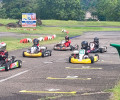JAA focuses on essential services amid COVID-19 outbreak
The Jamaica Automobile Association(JAA) has made a move to retain some of its core services, amid the Covid-19 disease local outbreak.

JAA Deputy General Manager Jason McNeish said the services provided by the JAA are those, which it considers essential at this time, as the Jamaican government’s measures to reduce movement and mass gatherings inhibits persons from accomplishing some important tasks.
“We understand the need for persons to stay home as much as possible, so as to contain the spread of the virus. As a result, our employees are on hand to provide much needed services for our members and customers,” he added.
The services which are being offered at this time include valet services to register vehicles atthe Inland Revenue Department (Tax Offices); and valet services to certify motor vehicle fitness at the examination depots. In addition, the JAA will also maintain its 24/7 island wide crash and emergency roadside assistance; and the 24/7 access to its JAA ADVANCE Card, customer service and vendor support.
Mr McNeish pointed out that, its employees will exercise the required sanitisation methods when dealing with customers and their vehicles.
“Our team members are required to wash their hands and sanitise as often as possible; in addition, all vehicles are sanitised prior to and after use,” he explained.
The JAA is also encouraging its patrons and members of the public, to sanitise their vehicles’ door handles, steering wheels, shifter knobs, and seats, among other parts, on a daily basis; as well as wash their hands frequently for at least 20 seconds, using soap and water. They should also avoid touching their face, in order to limit contraction and spread of the virus.
As of today, Jamaica has 38 confirmed Covid-19 cases. The Government of Jamaica was recognised by the World Health Organisation for their leadership in preparing the country for COVID-19. Jamaica has proactively employed aggressive measures to contain the spread of the virus (i.e. border controls, national curfew, closure of schools, retail shops, bars and restaurants, social distancing measures, ongoing public sensitization on preventative methods, contact tracing and setting up isolation wards and centres).

 Facebook
Facebook Twitter
Twitter






